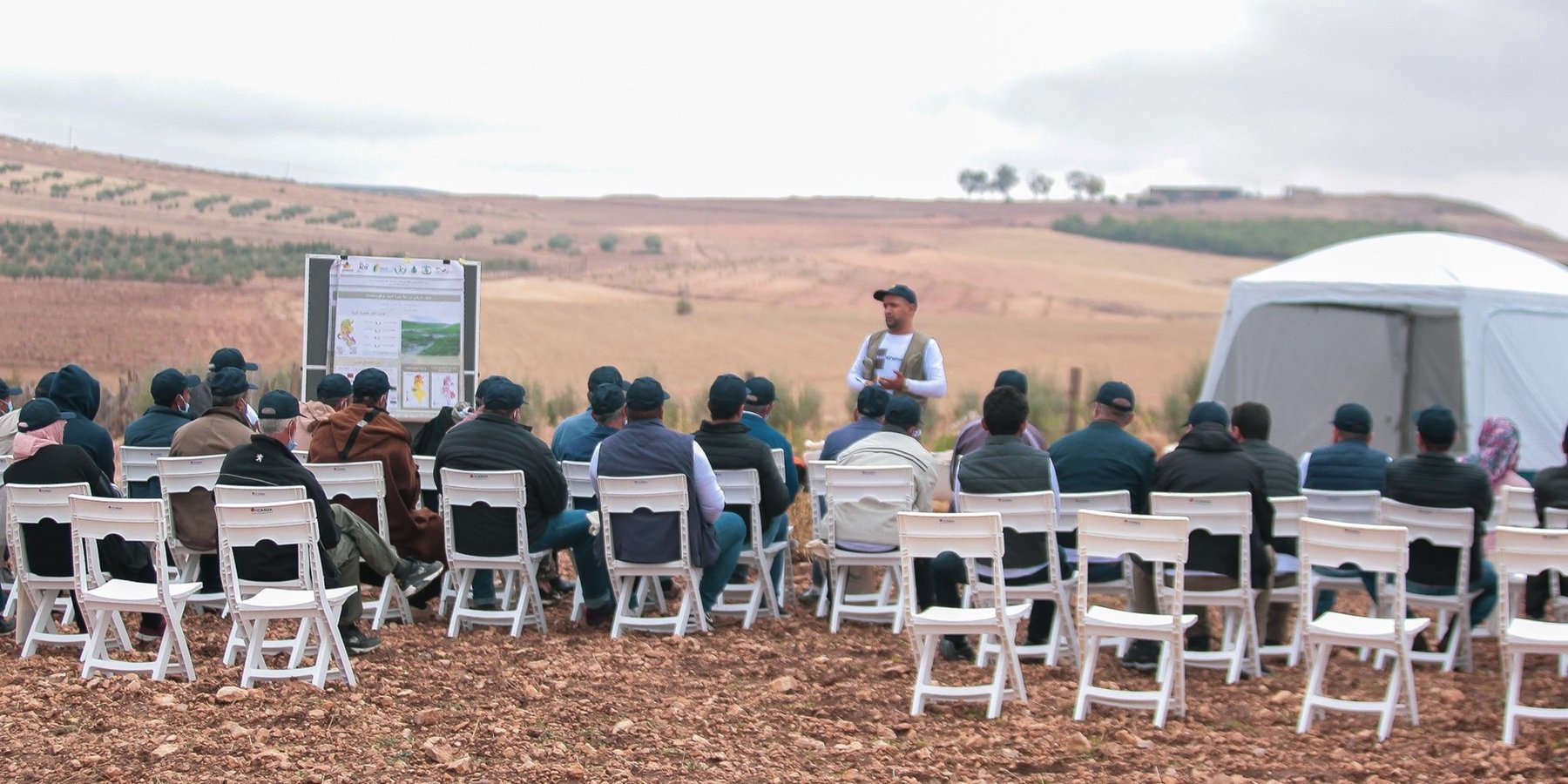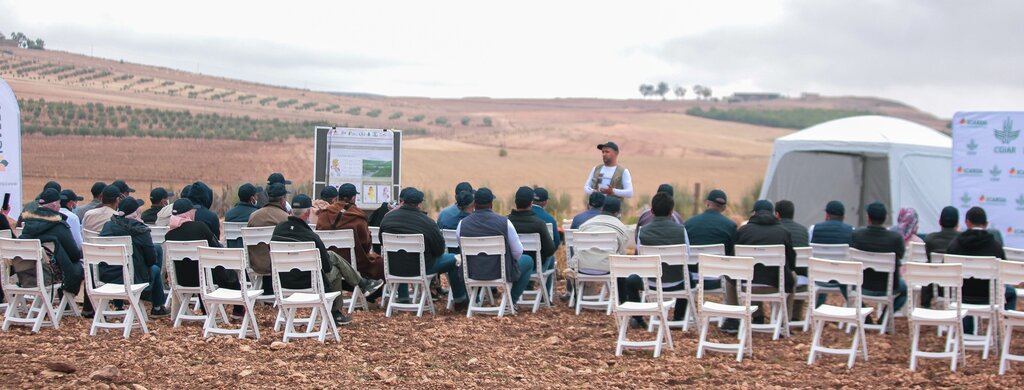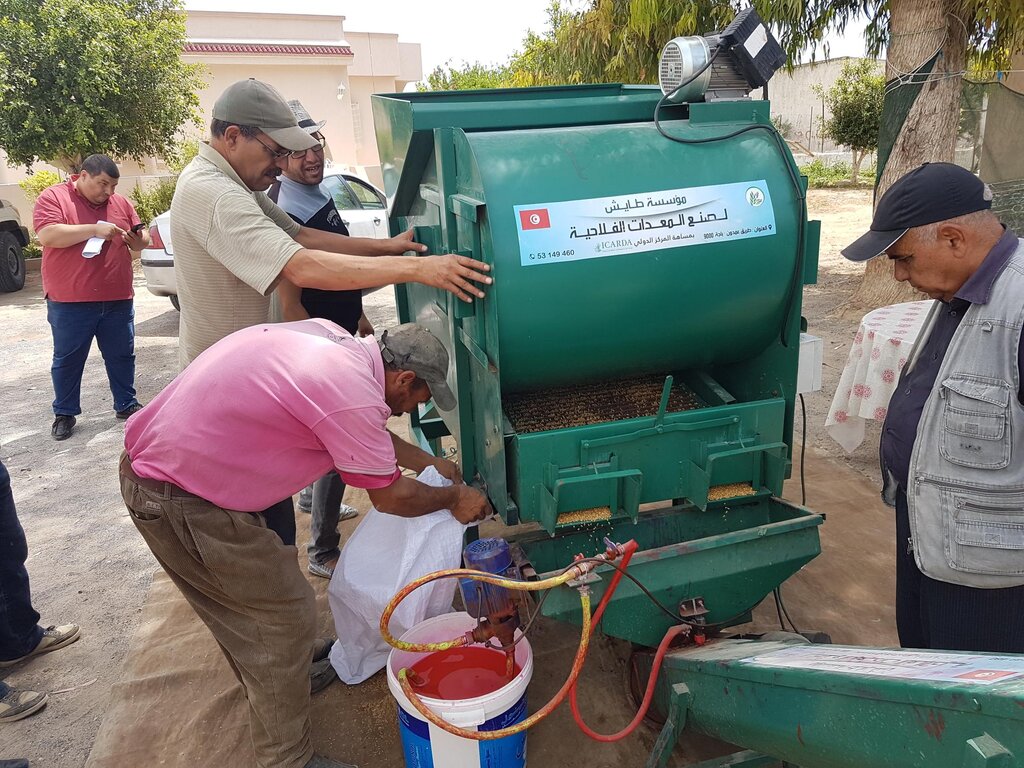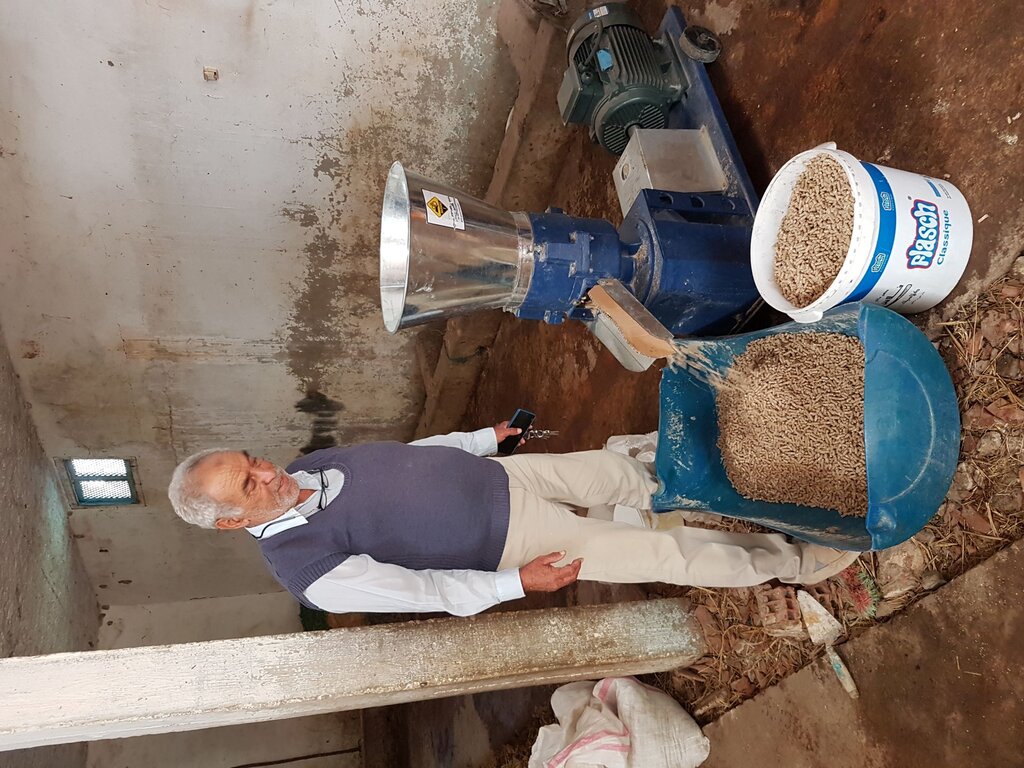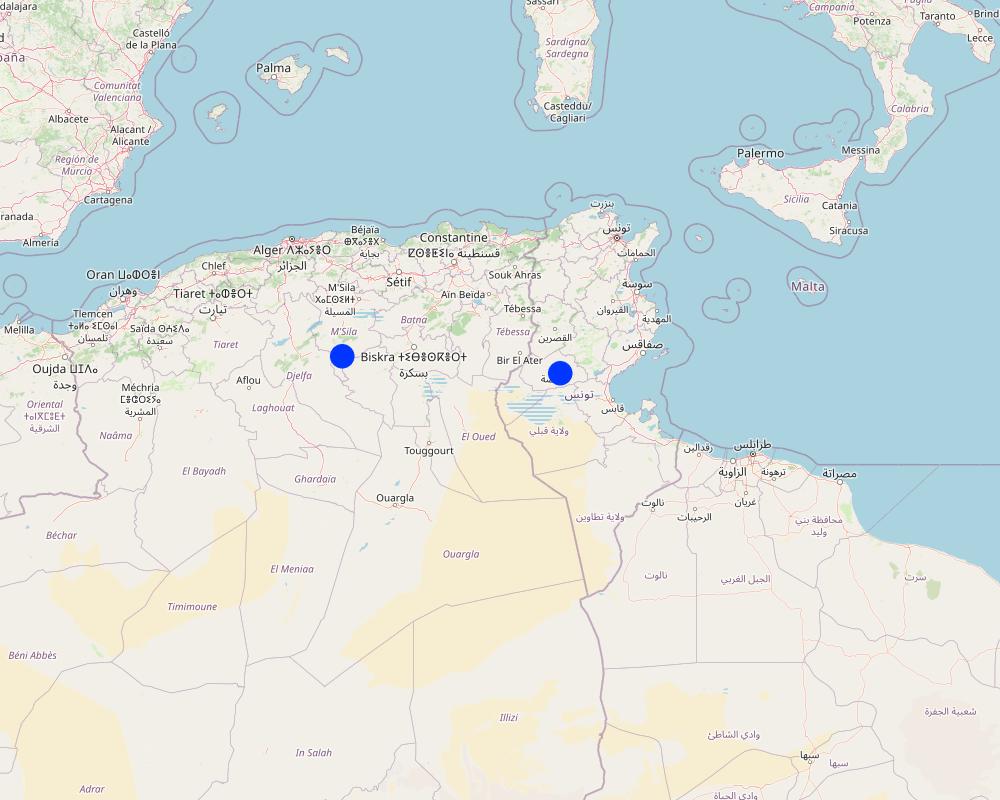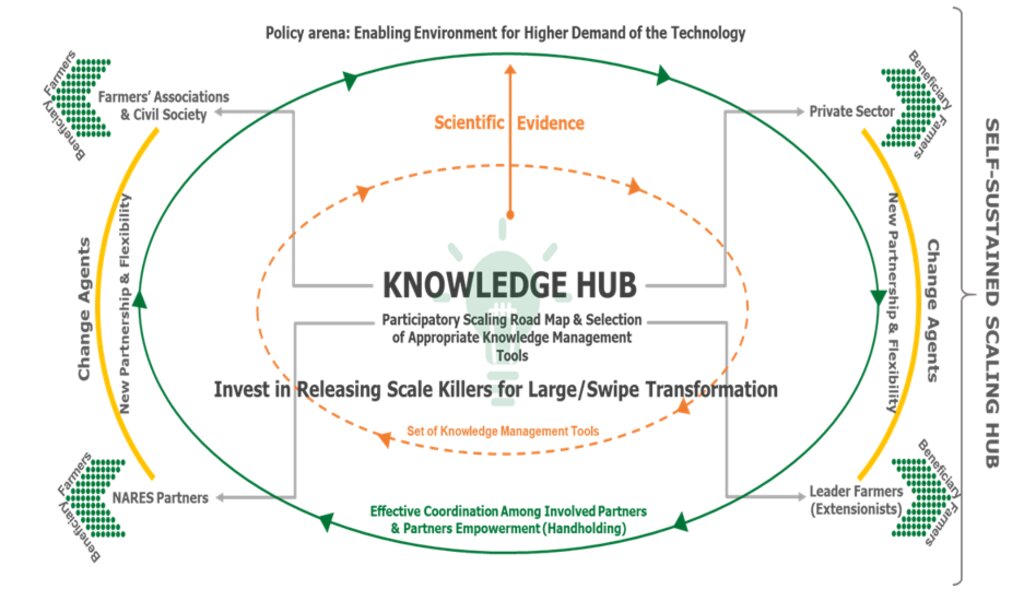The 4-Wheels Approach for sustainable scaling [Tunisie]
- Création :
- Mise à jour :
- Compilateur : Joren Verbist
- Rédacteur : –
- Examinateurs : William Critchley, Rima Mekdaschi Studer
approaches_6885 - Tunisie
Voir les sections
Développer tout Réduire tout1. Informations générales
1.2 Coordonnées des personnes-ressources et des institutions impliquées dans l'évaluation et la documentation de l'Approche
Personne(s) ressource(s) clé(s)
Agricultural Economist:
Aymen Frija
International Center of Agricultural Research in Dry Areas (ICARDA)
Tunisie
Specialist on Economics and Participatory Methods:
Idoudi Zied
International Center of Agricultural Research in Dry Areas (ICARDA)
Tunisie
Agricultural Innovation Specialist:
Rudiger Udo
International Center of Agricultural Research in Dry Areas (ICARDA)
Tunisie
Nom du projet qui a facilité la documentation/ l'évaluation de l'Approche (si pertinent)
ICARDA Institutional Knowledge Management InitiativeNom du ou des institutions qui ont facilité la documentation/ l'évaluation de l'Approche (si pertinent)
International Center for Agricultural Research in the Dry Areas (ICARDA) - Liban1.3 Conditions relatives à l'utilisation par WOCAT des données documentées
Quand les données ont-elles été compilées (sur le terrain)?
2022
Le compilateur et la(les) personne(s) ressource(s) acceptent les conditions relatives à l'utilisation par WOCAT des données documentées:
Oui
1.4 Références au(x) questionnaire(s) sur les Technologies de GDT
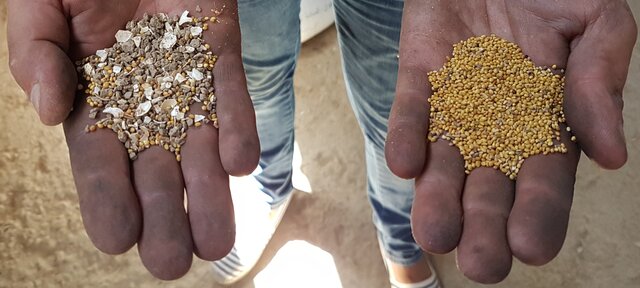
Small-Scale Seed Cleaning Unit [Tunisie]
The mobile seed cleaning machine improves the livelihoods of smallholder farmers in Tunisia by significantly enhancing seed quality, increasing crop production, reducing workload and costs, and promoting local value chains and social cohesion.
- Compilateur : Joren Verbist
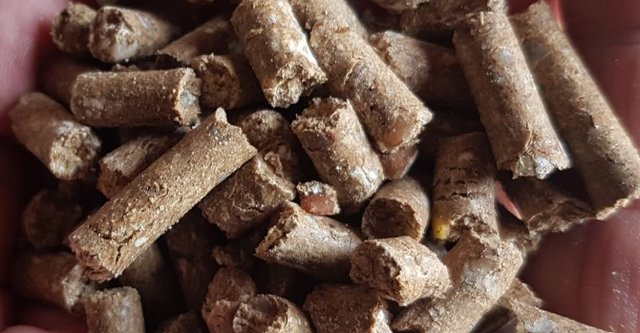
Small-Scale Nutrient-Dense Pellet Production [Tunisie]
Compressing agro-industrial by-products produces nutrient-dense livestock feed pellets that can compete with expensive and imported alternatives. This innovation consists of a small-scale compressor or "pelletizer" and formulae to create feed pellets of sufficient quality with locally available inputs.
- Compilateur : Joren Verbist
2. Description de l'Approche de GDT
2.1 Courte description de l'Approche
The 4-Wheels Approach addresses the challenge of slow adoption of agricultural innovations among smallholder farmers by establishing Knowledge Hubs and partnerships with diverse stakeholders. The focus is on income-generating technologies and essential factors behind successful scaling up of innovations, ultimately driving agricultural modernization and sustainability.
2.2 Description détaillée de l'Approche
Description détaillée de l'Approche:
The challenge of low and slow adoption of innovations from agricultural research by smallholder farmers is difficult, complex, and is impeding the progress of agricultural modernization in many developing countries. This issue has negative consequences on farm productivity and farmers' livelihoods. Furthermore, it influences the outcomes of investments made by both national and international agricultural research and development initiatives. The problem is exacerbated by evolving climatic and social conditions, which makes more urgent the need for systemic transformation and modernization to enhance food production - while ensuring sustainability.
To confront this challenge of low rates of scaling up and adoption, the International Center of Agricultural Research in Dry Areas (ICARDA) introduced and validated the “4-Wheels Approach” in countries where ICARDA is active, including Algeria and Tunisia. Among other innovations, two types of machinery are being scaled up this way: (a) the pelletizer (which creates feed pellets from by-products) and (b) the seed cleaning machine (for mechanical seed cleaning, substantially reducing workload). Both technologies have been documented in WOCAT’s global database.
The 4-Wheels Approach is built upon Knowledge Hubs and dynamic partnerships. Knowledge Hubs encompass physical structures, such as (informal) training centres, which usually belong to local farmers’ associations and cooperatives. The purpose of these hubs is to refine and disseminate knowledge locally in a self-sustained way, potentially through established partnerships with key local and regional stakeholders and scaling partners. Four categories of stakeholders, also referred to as change-agents and facilitators of technology dissemination, are identified: i) farmers’ groups and various other local associations, ii) civil society (including non-governmental organizations (NGOs) and the private sector), iii) national public development partners, and iv) lead farmers and extensionists, all of whom play a pivotal role in holding the key knowledge about the technology and spreading it locally. Consequently, these Knowledge Hubs serve to further adapt and mainstream technical knowledge through intermediary beneficiaries (also called proxies or “ambassadors” of the technology), who in turn facilitate dissemination to the ultimate users and beneficiaries, namely the farmers. Viewing the approach’s scaling and Knowledge Hubs through this lens underscores the necessity of investing in continuous and comprehensive networking, which doesn’t overlook any of the possible and relevant scaling partners.
The implementation of the 4-Wheels Approach via Knowledge Hubs and collaborative partnerships has emerged as a compelling strategy for challenges in the uptake of agricultural innovations, fostering a sustainable pathway towards modernization, and thus uplifting the well-being of smallholder farmers in developing areas. The concepts of 4-Wheels Approach and Knowledge Hubs are closely related and interlinked/integrated. The participation of the four types of partners who are engaged through the 4-Wheels Approach within the Knowledge Hub activities allows them to better understand, participate and advocate for relevant local innovations. The 4-Wheels Approach ensures the concentrated involvement of scaling partners of different background within the same landscape, and thus efforts to engage innovation actors become more fruitful by being more accessible and inclusive.
Acknowledgement: This research was funded by the CLCA project (funded by IFAD), PROSOL (funded by GIZ), and OneCGIAR initiative on agroecology. All of the previous projects and initiatives are implemented and coordinated by the International Center for Agricultural Research in the Dry Areas (ICARDA). The projects partnered with national partners including the OEP (Office de l’elevage et des pâturages) for the training of the cooperatives, as well as Tunisia’s National Agricultural Research Institute (Institut National de la Recherche Agronomique en Tunisi, INRAT) and the National Institute of Field Crops (Institut National des Grands Cultures, INGC) which selected the cooperatives, and the Regional Department for Agricultural Development (Commissariat Regional de Développement Agricole, CRDA) which facilitated the access to farmers communities and creation of knowledge hubs. We would like to thank all partners for their contributions and collaboration.
2.3 Photos de l'approche
2.5 Pays/ région/ lieux où l'Approche a été appliquée
Pays:
Tunisie
Map
×2.6 Dates de début et de fin de l'Approche
Si l'année précise est inconnue, indiquez approximativement quand l'Approche a démarré:
il y a moins de 10 ans (récemment)
2.7 Type d'Approche
- fondé sur un projet/ programme
2.8 Principaux objectifs de l'Approche
The aim of this approach is to achieve sustainable scaling and foster greater adoption of innovations. This is pursued through the establishment of Knowledge Hubs (as spaces of innovation) where, the formation of partnerships (based on the 4-Wheels Approach), and the research into viable business models is carefully and step-wise implemented (in reference list see the protocol for implementation in Frija & Idoudi 2020).
2.9 Conditions favorisant ou entravant la mise en œuvre de la(des) Technologie(s) appliquée(s) sous l'Approche
disponibilité/ accès aux ressources et services financiers
- entrave
A minimum of financial resources are needed to create and establish the knowledge hub in the form of informal training center at the cooperative and farmers association level. These fees aims at creating a local space for the community which can be “pedagogically” relevant for further exchange, discussions, trainings, and joint decision making by the community. Such spaces are material investments which can partly enhance the social capital and support the process of building collective cognitive capacity of farmers.
cadre institutionnel
- entrave
The 4-Wheels Approach supports the process of technology transfers in countries where there is a lack of connections and collaboration between research and development. Under such institutional conditions where extension services are low and unavailable, and where research programs are disconnected from the real concrete problems and development bottlenecks, the 4-Wheels approach can be instrumental to leverage the public investments in technology transfers by creating local performing knowledge hubs which would remain sustainable thanks to the mobilization of all relevant innovation and scaling partners (as identified in the 4-wheel partners typology – see above
collaboration/ coordination des acteurs
- favorise
This was rather enabling as different actors like OEP (livestock agency) on the regional level as well as national level were always willing to collaborate with ICARDA and the different beneficiary communities of our different projects (listed in the acknowledgement). This is also especially relevant given that the early technologies for which we built and started piloting the concept of knowledge hubs and partnership for scaling were focusing on forage crops and forage mixtures . Also INRAT was happy to collaborate in the development of the concepts and to also facilitate the overall process of partners mobilization, including collaboration with private actor such as forage seeds companies, pelletizer or seed cleaning manufacturers etc
connaissances sur la GDT, accès aux supports techniques
- favorise
Technical support was guaranteed by OEP, INRAT and ICARDA and private actor. The whole idea of these partners is to generate knowledge through experimentation and demonstration, and sustain it through capacity development and partnership/networking. Communities and particularly farmers associations were key in this regards as these are supposed to be the main holders of knowledge after the project ending. The whole process of creation of KHs aims at enhancing and sustaining knowledge about key agricultural practices and technologies locally, thus making it more inclusive and accessible.
marchés (pour acheter les intrants, vendre les produits) et prix
- favorise
Theoretically, markets and prices are not key aspects since we are talking about knowledge. Currently, the problem is about access to lacking knowledge by smallholder farmers and is not about “price of the knowledge” or who is paying for it. However, scaling of KH themselves would involve the development of a business model in which “payment for knowledge” would be key for its scaling and sustainability.
3. Participation et rôles des parties prenantes impliquées dans l'Approche
3.1 Parties prenantes impliquées dans l'Approche et rôles
- exploitants locaux des terres / communautés locales
Farmer Cooperatives
Farmers communities, cooperatives and members are asked to engage into the participatory innovation process by defining their needs, problems, and helping to identify possible affordable solutions. They are also asked to offer a space of concentration where the overall R4D teams can meet, interact and discuss. This space is meant to be sustainable and will be used by the cooperative after the end of the project.
- chercheurs
INRAT and OEP
Researchers are asked to facilitate the whole process of community engagement and Knowledge Hub installation. They are also asked to install some local experiments which can provide more contextual knowledge about technologies benefits and impact in specific localities. Researchers are also asked to design and facilitate appropriate networking event thus connecting the cooperatives with all relevant public and private actors who are operating for the considered technologies of the Knowledge Hub.
- secteur privé
Manufacturer of the seed cleaning unit and Importer of the Pelletizer machine
Private sector in general, supports the communities with some capacity development activities in case they are providers of the technology to be scaled (object of the Knowledge Hubs).
They also ensure good affordable and reliable access of farmers of the community to the relevant technologies object of the hub.
In this case, they did: design and produce, or import machine; train farmers in use and maintenance; perform after sale services
- organisation internationale
ICARDA
Lead and coordination; installation of the hub, facilitation between research and development actors; organize training and demonstration
Si plusieurs parties prenantes sont impliquées, indiquez l'organisme chef de file ou l'institution responsable:
ICARDA
3.2 Participation des exploitants locaux des terres/ communautés locales aux différentes phases de l'Approche
| Participation des exploitants locaux des terres/ communautés locales | Spécifiez qui était impliqué et décrivez les activités | |
|---|---|---|
| initiation/ motivation | aucun | ICARDA and OEP led discussion with the importer and manufacturer. |
| planification | aucun | Discussion between ICARDA, OEP, GIZ, INGC, to identify potential beneficiaries of the machines. |
| mise en œuvre | interactive | ICARDA and OEP discussed with farmer cooperatives their interests in the machines. ICARDA, OEP, and manufacture produced and distributed the machines. Financial contribution of the farmer cooperation was requested to foster ownership. |
| suivi/ évaluation | interactive | ICARDA and OEP visits the farmer cooperatives every three months to collect business data, see if the machine operates correctly, and to identify constraints. |
3.3 Diagramme/ organigramme (si disponible)
Description:
The 4-Wheels Approach for effective partnership for scaling
Auteur:
Aymen Frija, Zied Idoudi. (18/12/2020). Self-Sustained “Scaling Hubs” for Agricultural Technologies: Defnition of Concepts, Protocols, and Implementation. (ICARDA)
3.4 Prises de décision pour la sélection de la Technologie/ des Technologies
Indiquez qui a décidé de la sélection de la Technologie/ des Technologies à mettre en œuvre:
- les spécialistes de la GDT seuls
Expliquez:
ICARDA and partners investigated relevant and suitable technologies. Essential was that the business model is self-sustaining.
Spécifiez sur quelle base ont été prises les décisions:
- l'évaluation de connaissances bien documentées en matière de GDT (prises de décision fondées sur des preuves tangibles)?
- les résultats de recherches?
- expériences et opinions personnelles (non documentées)
4. Soutien technique, renforcement des capacités et gestion des connaissances
4.1 Renforcement des capacités/ formation
Une formation a-t-elle été dispensée aux exploitants des terres/ autres parties prenantes?
Oui
Spécifiez qui a été formé:
- exploitants des terres
Si pertinent, spécifiez le genre, l'âge, le statut, l'ethnie, etc.
Farmers of the cooperation were trained
Formats de la formation:
- sur le tas
- zones de démonstration
- réunions publiques
- cours
Thèmes abordés:
The use of the machinery, their maintenance and recipes for pellets
4.2 Service de conseils
Les exploitants des terres ont-ils accès à un service de conseils?
Oui
Spécifiez si le service de conseils est fourni:
- dans les champs des exploitants?
4.3 Renforcement des institutions (développement organisationnel)
Des institutions ont elles été mises en place ou renforcées par le biais de l'Approche?
- oui, modérément
Spécifiez à quel(s) niveau(x), ces institutions ont été renforcées ou mises en place:
- local
Décrivez l'institution, ses rôles et responsabilités, ses membres, etc.
Farmer cooperation and knowledge hubs were established. The rationale is that because the machines are economically viable on their own, the cooperation will keep on sharing the knowledge using the hubs.
Précisez le type de soutien:
- renforcement des capacités/ formation
- équipement
4.4 Suivi et évaluation
Le suivi et l'évaluation font ils partie de l'Approche? :
Oui
Commentaires:
By monitoring certain indicators, such as the number of beneficiaries, pellets produced, seed cleaned, etc. In addition, ICARDA is frequently visiting the hubs to see progress and solve problems that occurred.
Si oui, ce document est-il destiné à être utilisé pour le suivi et l'évaluation?
Oui
4.5 Recherche
La recherche a-t-elle fait partie intégrante de l’Approche?
Oui
Spécifiez les thèmes:
- sociologie
- économie/ marketing
- écologie
- technologie
5. Financement et soutien matériel externe
5.1 Budget annuel de la composante GDT de l'Approche
Si le budget annuel précis n'est pas connu, indiquez une fourchette:
- 10 000-100 000
Commentez (par ex. principales sources de financement/ principaux bailleurs de fonds):
This includes the machines and trainings.
5.2 Soutiens financiers/ matériels fournis aux exploitants des terres
Les exploitants des terres ont-ils reçu un soutien financier/ matériel pour la mise en œuvre de la Technologie/ des Technologies?
Oui
Si oui, spécifiez le(s) type(s) de soutien, les conditions et les fournisseurs:
The land users, organized in farmer cooperation, were supported with machinery
5.3 Subventions pour des intrants spécifiques (incluant la main d'œuvre)
- équipement
| Spécifiez les intrants subventionnés | Dans quelle mesure | Spécifiez les subventions |
|---|---|---|
| machines | en partie financé | The farmer cooperatives made a financial contribution. |
5.4 Crédits
Des crédits ont-ils été alloués à travers l'Approche pour les activités de GDT?
Non
5.5 Autres incitations ou instruments
D'autres incitations ou instruments ont-ils été utilisés pour promouvoir la mise en œuvre des Technologies de GDT?
Non
6. Analyses d'impact et conclusions
6.1 Impacts de l'Approche
Est-ce que l'Approche a autonomisé les exploitants locaux des terres, amélioré la participation des parties prenantes?
- Non
- Oui, un peu
- Oui, modérément
- Oui, beaucoup
Land users were empowered because the machines strengthen the cooperatives.
Est-ce que l'Approche a aidé les exploitants des terres à mettre en œuvre et entretenir les Technologies de GDT?
- Non
- Oui, un peu
- Oui, modérément
- Oui, beaucoup
Est-ce que l'Approche a amélioré les connaissances et les capacités des exploitants des terres pour mettre en œuvre la GDT?
- Non
- Oui, un peu
- Oui, modérément
- Oui, beaucoup
Farmers received training on how to operate and maintain the machinery, but they are still struggling with the optimal recipes for the pellets.
Est-ce que l'Approche a construit/ renforcé les institutions, la collaboration entre parties prenantes?
- Non
- Oui, un peu
- Oui, modérément
- Oui, beaucoup
The projects was a successful collaboration between many different organization. Its success has strengthen the relations.
Est-ce que l'Approche a amélioré l'égalité entre hommes et femmes et autonomisé les femmes et les filles?
- Non
- Oui, un peu
- Oui, modérément
- Oui, beaucoup
Conventionally, the cleaning of seeds was done by hand by women and children. The use of machinery has substantially lowered their workload.
Est-ce que l'Approche a conduit à améliorer la sécurité alimentaire et/ou la nutrition?
- Non
- Oui, un peu
- Oui, modérément
- Oui, beaucoup
The use of the machinery lead to improved food security.
6.2 Principale motivation des exploitants des terres pour mettre en œuvre la GDT
- augmenter la production
- augmenter la rentabilité/ bénéfice, rapport coûts-bénéfices
- réduire les risques de catastrophe
- réduire la charge de travail
6.3 Durabilité des activités de l'Approche
Les exploitants des terres peuvent-ils poursuivre ce qui a été mis en œuvre par le biais de l'Approche (sans soutien extérieur)?
- oui
Si oui, décrivez de quelle manière:
The machines on their self are economically viable.
6.4 Points forts/ avantages de l'Approche
| Points forts/ avantages/ possibilités du point de vue de l'exploitant des terres |
|---|
| Seed Cleaning Unit: better seeds, improves yield, higher income, less workload |
| Feed Pelletizer: use of agricultural by-products, cheap compound feed, less workload |
| Points forts/ avantages/ possibilités du point de vue du compilateur ou d'une autre personne ressource clé |
|---|
| Major strength of the 4-Wheels approach is the aspect of the collaboration, between private actor (machine manufacturer or importer), farmer organization, lead farmer of the organization, OEP (extension), INRAT (research for composition). This multi-actor collaboration is key of the 4-wheel approach and key of the success of the scaling of the two technologies |
| Seed Cleaning Unit: better seeds, improves yield, higher income, less workload |
| Feed Pelletizer: use of agricultural by-products, cheap compound feed, less workload |
| The 4-Wheels Approach ensures ownership over the machinery while building capacity |
6.5 Faiblesses/ inconvénients de l'Approche et moyens de les surmonter
| Faiblesses/ inconvénients/ risques du point de vue de l’exploitant des terres | Comment peuvent-ils être surmontés? |
|---|---|
| Feed Pelletizer: Farmers still don’t know the optimum mixture of ingredients to produce pellets for each region and categories of animals (sheep / cow / camel). | Intense collaboration with agricultural research |
| Faiblesses/ inconvénients/ risques du point de vue du compilateur ou d'une autre personne ressource clé | Comment peuvent-ils être surmontés? |
|---|---|
| A risk of the approach is the sustainability. It is not sure (yet) if and how the knowledge hub will continue once there is no more support from ICARDA and (national) partners. |
The theoretical idea is that through the income generation with these machines they (farmer organization) will continue training others and sharing their knowledge. But this theory needs to be validated and proven. |
| Seed Cleaning Unit: quite expensive for a small scale farmer (7,000 US$ nowadays) | To buy the unit as a farmer organization (cooperation) and use it by many farmers |
| The Feed Pelletizer can be expensive for individual small scale farmer, availability of spare parts of pelletizing machine only in Tunis (access problem), needs available by-products (they are only seasonable), need access to subsidized barley and wheat bran to produce at competitive prices. Farmer organizations have no quota for subsidized barley and wheat bran, only individual farmers to a limited amount and feed enterprises | To use the feed pelletizer as a group to reduce costs per farmer; transform cooperative into a feed processing enterprise as they have access to subsidized barley and wheat bran |
7. Références et liens
7.1 Méthodes/ sources d'information
- interviews/ entretiens avec les spécialistes/ experts de GDT
- compilation à partir de rapports et d'autres documents existants
7.3 Liens vers les informations pertinentes disponibles en ligne
Titre/ description:
Aymen Frija, Zied Idoudi. (18/12/2020). Self-Sustained “Scaling Hubs” for Agricultural Technologies: Definition of Concepts, Protocols, and Implementation. Lebanon: International Center for Agricultural Research in the Dry Areas (ICARDA).
URL:
https://hdl.handle.net/20.500.11766/12248
Titre/ description:
Mourad Rekik, Aymen Frija, Zied Idoudi, Santiago López Ridaura, Nasreddine Louahdi, Boubaker Dhehibi, Dina Najjar, Udo Rudiger, Enrico Bonaiuti, Laura Becker, Zohra Djender Ghallem, Hatem Cheikh M'hamed, Mina Devkota Wasti, Barbara Rischkowsky. (11/3/2021). Use of Conservation Agriculture in Crop-Livestock Systems (CLCA) in the Drylands for Enhanced Water Use Efficiency, Soil Fertility and Productivity in NEN and LAC Countries – Progress Highlights: Year (3) - April 2020 to March 2021. Lebanon: International Center for Agricultural Research in the Dry Areas (ICARDA).
URL:
https://hdl.handle.net/20.500.11766/12703
Titre/ description:
Aymen Frija, Zied Idoudi, Udo Rudiger, Jebali Oussama, Hatem Cheikh M'hamed, Haithem Bahri, Boubaker Dhehibi, Mourad Rekik, Imen Hemissi, Salah Ben Youssef, Khouloud Chetoui, Mounir Louhaichi, Mouldi Gamoun, Asma Souissi. (6/12/2022). Soil Protection and Rehabilitation of Degraded Soil for Food Security – ProSol: Towards the Effective Scaling of Soil and Water Conservation Technologies under Different Agroecosystems in North and Central West Tunisia – SWC@Scale/ProSol: Technical Progress Report/ January – August 2022. Beirut, Lebanon: International Center for Agricultural Research in the Dry Areas (ICARDA).
URL:
https://hdl.handle.net/20.500.11766/67835
Liens et modules
Développer tout Réduire toutLiens

Small-Scale Seed Cleaning Unit [Tunisie]
The mobile seed cleaning machine improves the livelihoods of smallholder farmers in Tunisia by significantly enhancing seed quality, increasing crop production, reducing workload and costs, and promoting local value chains and social cohesion.
- Compilateur : Joren Verbist

Small-Scale Nutrient-Dense Pellet Production [Tunisie]
Compressing agro-industrial by-products produces nutrient-dense livestock feed pellets that can compete with expensive and imported alternatives. This innovation consists of a small-scale compressor or "pelletizer" and formulae to create feed pellets of sufficient quality with locally available inputs.
- Compilateur : Joren Verbist
Modules
Aucun module trouvé


